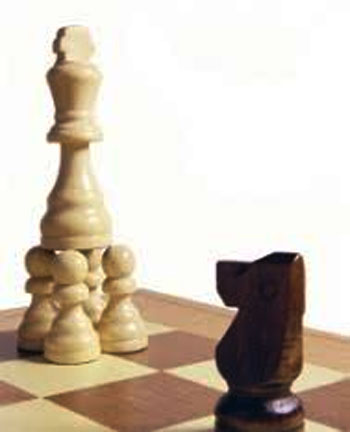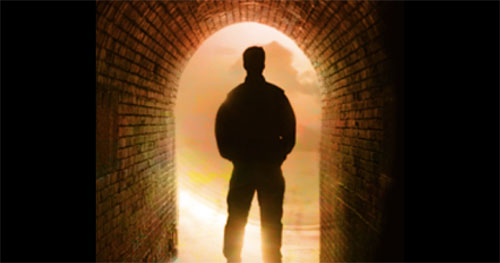The Perilous Path Towards Awakening (4)
by Bernhard Guenther
Read the third part of the article
.
Trap of Superiority
The sense of feeling better than others who are still be plugged into the Matrix, or who haven’t had any profound awakening experiences; the lure of looking down on them is the most common trap many people fall into. This is especially the case when truth seeking is not combined with inner work. In the more extreme manifestation of superiority, we lash out on others, calling them names and attacking them personally for being “blind” and not aware (most often conducted via the internet/social media, hiding behind a screen).

The delusion of superiority is, in fact, a symptom of still being plugged into the Matrix, since the Matrix feeds off of Service to Self (STS) ego separation-consciousness (with its manifestation of “competition” in people’s personal and/or professional lives). We see this attitude play itself out most often in “truth seekers” who just “woke up” to the basics of the 3D matrix (the political illusion, government corruption and relating symptoms: the banking cartel, fake war on terror, lies of the mainstream media, false flag attacks, etc.) and lash out on people who are still asleep and hypnotized.
In a sense, this is a normal stage as well. As the saying goes “The truth shall set you free, but first it will feel very uncomfortable” (ironically enough, this was coined by CIA controlled opposition asset Gloria Steinham). So, anger is not to be judged as “bad” (spiritual bypassing), but we need to remain mindful to avoid projecting it outwardly.
This trap subject also ties into shadow projection. When we get emotionally riled up and project that reactive energy onto others – coming from sense of superiority – we actually feed the occult forces in the hyperdimensional realms. It stems from the “predator mind” by which these forces work through us, triggering mechanical/reactive behaviors to produce the “loosh” frequency they feed upon.
There are varying degrees of superiority complexes, with various manifestations which we all can fall into (from subtle to very apparent). As long as we have an inner sense of superiority (especially the disease of moral superiority) or “specialness” in comparison to others – even without any external projections – the matrix has its hooks in us.
This can also happen to “wanderers“, (individuals whose souls have incarnated from a higher density (4th or 6th density) into this 3rd density with a specific mission to accomplish in order to assist humanity), who are very identified with the wanderer (“starseed”) concept (seeing oneself as “better” than “humans”), and the ego feeds off of this divisionary mentality. This is also how negative forces target, hijack and derail wanderers from their mission – by appealing to the shadow aspect of their ego.
The trap of superiority is so common that it is almost a “natural” by-product of the awakening process. It can manifest itself at any given stage, even after having had a mystical awakening experience which the ego then hijacks. In other words, the ego believes itself to be awake, turning into a “spiritualized ego”. Many self-proclaimed masters/gurus (or even popular figures in the “truth movement”) have big superiority issues (cult of personality disorder) which their followers often feed with their “worship” and hierarchical-authoritarian programming, coming from a self-perceived inferior state of being, and thus putting another person on a pedestal.
“No matter what the practice or teaching, ego loves to wait in ambush to appropriate spirituality for its own survival and gain.”– Chögyam Trungpa
More often than not, we have no control over when thoughts/feelings of superiority enter us. It can happen as a mechanical reflex response – as the sudden appearance of feelings of jealousy or anger. The key is self-observation, not trying to get rid of it (the axiom “what we resist persists” applies here), to say nothing of judging ourselves for thinking/feeling that way, which is very self-defeating.
Avoid trying to push it away or acting on it; instead, we keep to working on ourselves, which helps to eventually detach our vibrational field from such thought intrusions; by not identifying with them positively (accepting) or negatively (judging ourselves/forceful resistance), we can slowly release them. Patience is key here.
A good thing to keep in mind that everyone reading this article was once fully “asleep”, caught up in the Matrix control mechanisms – none of us were born “awake”. We’ve all had our individual awakening moments, realizing that we have been believing in lies our entire lives, and that path to freedom is different for each of us. That’s where compassion and empathy come in, for both ourselves and others, even though blind/unconscious people who “dream to be awake” tend to support the matrix agenda, and hence unknowingly do a lot of “harm” despite their well-meaning intentions (for example: the belief in government, engaging in the political puppet show, which stems from a “Stockholm Syndrome” mechanism which is based on social conditioning, i.e. authoritarian programming, and hence feeding into the divide & conquer agenda).

It is important, though, to not fall into “blind compassion” or intellectualize compassion, which can result in a fake mask of “compassion” and pity for others, which, ironically, also stems from an unconscious sense of superiority. From a bigger picture perspective, it is also important to keep in mind that not everyone is here to awaken during this current cycle. There is nothing wrong with this truth, and there is no judgment… it is merely a function of the cosmic equilibrium.
“Blind compassion is rooted in the belief that we are all doing the best we can. When we are driven by blind compassion, we cut everyone far too much slack, making excuses for others’ behavior and making nice situations that require a forceful ‘no’, an unmistakable voicing of displeasure, or a firm setting and maintaining of boundaries. These things can, and often should be done out of love, but blind compassion keeps love too meek, sentenced to wearing a kind face. Blind compassion is kindness rooted in fear, and not just fear of confrontation, but also fear of not coming across as a good or spiritual person.
When we mute our essential voice, our openness is reduced to a permissive gap, an undiscerning embrace, a poorly boundaries receptivity, all of which indicate a lack of compassion for ourselves (in that we don’t adequately protect ourselves). Blind compassion confuses anger with aggression, forcefulness with violence, judgment with condemnation, caring with exaggerated tolerance, and more tolerance with spiritual correctness.” – Robert Augustus Masters
Trap of forcefully trying to wake up others
Many of us who have taken the “red pill” and are increasingly-seeing through the lies and illusions of official culture can be eager to tell others what we have found out and realized in our journey. We want others, especially our friends and family, to “wake up” as well. We see how they suffer needlessly, supporting the forces which are oppressing them and leading them astray, so our intentions to wake up others are coming from a well intended place; sometimes, they’re just coming from a place of excitement with regards to sharing information.
However, two things are important to understand and apply: External Consideration and Strategic Enclosure.
“External Consideration” means adapting to the worldview/beliefs of another person, and thus not pushing information onto someone who didn’t ask for it in the first place. Sometimes, this approach involves supporting other peoples’ ‘illusions’ because they are not ready to hear the truth, let alone be assisted in becoming “un-plugged” from the Matrix Control System. In esoteric terms, “Giving without (sincere) asking” is a violation of free will. It may interfere with the soul lesson/path of the other person involved – an individual who needs to learn certain lessons for him/herself, even if that entails long periods of suffering and struggle.
In this context, we cannot “do” anything for another person, nor “save” them – if they are not engaged in the process of sincere self-work and earnestly seeking truth for themselves, it will most likely be counterproductive to engage with them by providing a contrasting point of view. The “asking” part of the equation doesn’t have to be verbal in nature – it depends upon the situation and context. On the other hand, not every “asking” cue is sincere, so trusting one’s intuitive hunches regarding what to share (and what to withhold) is important; simply being “curious” is not a sincere form of “asking”.
“To those people who simply pry into the occult from mere curiosity, we have nothing to say. They will obtain just as much as they deserve, and nothing more. ‘Ask and ye shall receive, seek and ye shall find, knock and it shall be opened unto you’ is equally as true today, in relation to esoteric knowledge, as it was 2000 years ago.
It invariably presupposes that the supplicator and the knocker are in real earnest, and that they seek only to satisfy the deep yearnings of the immortal soul. The doorkeeper, or guardian of the temple of truth is as mute as a granite rock to all others. They may supplicate, they may shout and bawl until they are hoarse, they may knock and buffet the door until they rouse a nation with their clamour, and if they approach in any other spirit than [earnest desire to satisfy the deep yearnings of the immortal soul], it is all to no purpose. We can never take the Kingdom of Heaven by storm.” – “The Hermetic Brotherhood of Luxor: Initiatic and Historical Documents of an Order of Practical Occultism” by Joscelyn Godwin
“Strategic Enclosure” relates to having a strategy with regards to how to present information that may challenge another’s belief systems. Sometimes it is more productive to remain silent than to drop “knowledge bombs” on an unsuspecting mind, let alone trying to convince another person through argument and debate (which only creates the emotional loosh for the occult forces to feed upon). This also ties into the saying “Do not give what is holy to the dogs; nor cast your pearls before swine, lest they trample them under their feet, and turn and tear you in pieces” – such is the biblical description of “cognitive dissonance” in its most basic of terms. At other times, however, directness and “calling a spade a spade” is needed as an appropriate response as well.
The drive to seek out truth in oneself and the world – and act upon it with integrity – has to come from oneself. No one can do it for another, and no one can push another to do it, until he/she himself/herself realizes the precarious times we live in (most often arising as the result of personal suffering and disillusionment), acts upon it, and starts to work on him/herself. Oftentimes, people do not start to sincerely seek truth or engage in deeper self-work until they have suffered, and are confronted with the inevitable disillusionment which subsequently arises, and surrender to it.

“Whether we use psychological or esoteric terminology, the basic fact remains the same: human beings do not earn free will except through self-discovery, and they do not attempt self-discovery until things become so painful that they have no other choice. If the individual makes no effort to expand his consciousness so that he can understand the nature of his total unfoldment and can begin to cooperate with it, then it will seem that he is the pawn of fate and has no control over his life. He can only earn his freedom by learning about himself so that he can understand what value a particular experience has for the development of his whole self.” – Liz Green
What we can do, however, is spread some “seeds of awareness”, giving people some “food for thought” so to speak, without trying to convince him/her of the veracity of the information, nor having any expectations about how they’ll receive it. Some seeds sprout, some never blossom, but never underestimate the butterfly-effect over “time”. Each situation is different, of course, which goes back to “External Consideration” and “Strategic Enclosure”.
“If you do find an extraordinary truth, shall we say, from extraordinary evidence, more than likely, then in the course of your life, if you come upon that, you quickly learn there was a path to that view. And it may be complex, it may be simple, but there was a way to it. You don’t jump straight to it without the intermediate stages. And the more remarkable that truth is the longer it takes to deeply acknowledge and know it – know it at a very inner [embodied] level.
Yet, we can observe that there is sort of a tremendous impulse to want to share our discoveries with people and to prove to them and to underline things and expound what we believe. But everybody has to wake up for him or herself. I’ve said this over and over. You cannot really do it for anyone else. So it is both unrealistic and unwise to say, to expect someone touted in a mainstream view of politics and culture and education to suddenly entertain [esoteric and fringe ideas].
The more outstanding the revelation the longer it takes to get to it. So we have to sort of respect that in a way. We have to expect also that it takes time for people to understand what is real and what is unreal. All we can do is set forth our discoveries and let people make of it what they will. And that takes discipline and a high degree of self-confidence. And amongst academics that is not always to be taken for granted. Because it is not just academic discipline but it is personal disciple in your own growth in your own being not just the computer element of our minds but all of the rest of the faculties as well.
And if we falter in our convictions, if we constantly need validation and reassurance then we start to compromise even our own materials. It is better not to do that at all. Just play your own game. Do your own thing and get as sharp and authentic as you can. And don’t stop and keep doing it. And it brings to mind the question of what actually is it when we say truth. And I very much feel, having worked with all levels of sort of philosophers, and academics, and psychologists, and mystics, and new agers… that being smart is not sufficient to know the truth.
And I would say that the truth reveals itself slowly depending on the intellectual, emotional, transcendental awareness of the individual. And those last two elements are sorely lacking in the average investigator – I would say. So their inquiry is necessarily therefore flat and rather one-dimensional. It is limited, to put it politely, like a [person] who cannot see the real substance of a situation because he does not really get it. He lacks sincerity, humility, and insight.” – Neil Kramer
At the same time, I also feel (and have seen) that the ideas of “external consideration” and “strategic enclosure” have been used as a buffer, an avoidance strategy, and a rationale to excuse people from being outspoken about the important issues which our world is facing in this day and age – or even with regards to what we truly think and feel, our own sense of vulnerability and openness. Oftentimes, there is this irrational fear and paranoia about what others may think of us as individuals if one is more outspoken – allowing opinions to frame our own sense of self-worth.
Read the fifth part of the article
yogaesoteric
July 4, 2019
